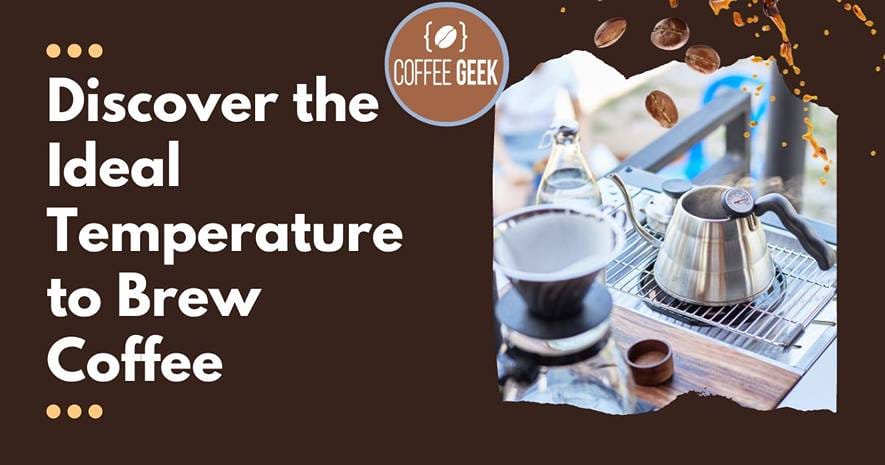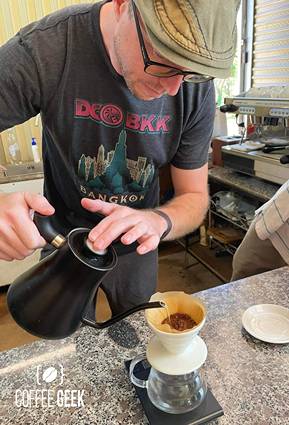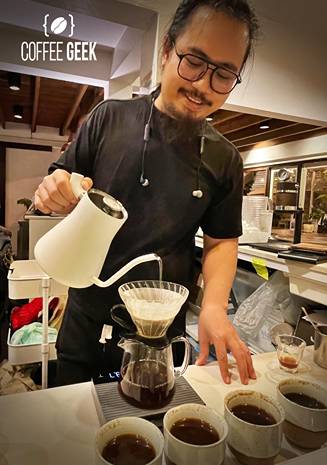If you’ve ever wondered about the secret to a flawless cup of coffee, look no further. It all begins with the ideal temperature to brew coffee, which plays a key role in extracting the best flavors from your beans.
In this article, we’ll unravel the mystery of the perfect brewing water temperature and share tips on how to master this vital aspect of coffee-making.
- Understanding the Importance of Water Temperature in Coffee Brewing
- What is the Ideal Temperature to Brew Coffee for Different Brew Methods?
- How to Measure and Control the Water Temperature for Coffee Brewing
- Factors Affecting Extraction: Grind Size, Brew Time, and Coffee Beans
- Identifying and Fixing Under-Extracted and Over-Extracted Coffee
- Ideal Temperature to Brew Coffee Conclusion
- FAQs
Understanding the Importance of Water Temperature in Coffee Brewing
How Does Water Temperature Affect Coffee Extraction?
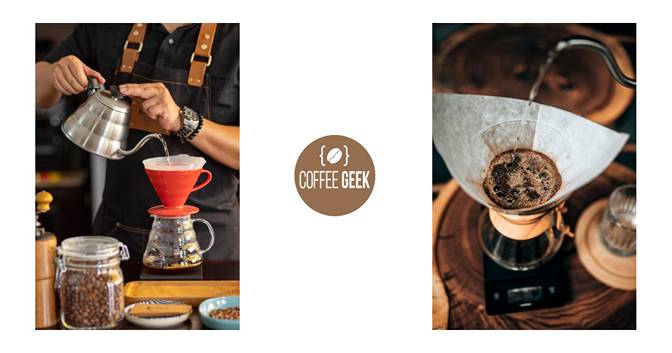
Water temperature plays a significant role in coffee extraction as it directly affects the solubility of coffee grounds.
The ideal coffee brewing temperature must be hot enough to extract the desirable compounds for hot beverage, such as oils, acids, and sugars, yet be cool enough to avoid extracting bitter or sour flavors from the beans.
With the right temperature, you can achieve a delicate balance of strong coffee flavor, pleasant aroma, and a delightful aftertaste.
What Happens at Different Temperature Levels?
At lower temperature levels, brewing coffee will result in under-extracted brews with a weak, sour taste.
On the other hand, using water that’s too hot will cause over-extraction, leading to bitter and burnt flavors.
Finding the best temperature of water for coffee brewing is crucial to strike a balance between these extremes for a well-rounded flavor profile.
Why is Maintaining the Right Temperature Essential for Perfect Coffee?
Optimal brew temperature is the cornerstone of making a heavenly cup of your coffee.
An ideal coffee brewing temperature guarantees a proper extraction of flavors, delivering that perfectly balanced, delightful liquid gold you crave.
By mastering the right temperatures for different brew methods like the French Press, Pour-over, or Espresso, you’ll be on your way to making a truly sensational cup every time.
What is the Ideal Temperature to Brew Coffee for Different Brew Methods?
French Press: The Optimal Temperature for Full Immersion Brewing
When it comes to French Press brewing, the ideal temperature of water for coffee ranges from 195 to 205 degrees Fahrenheit (90 to 96 degrees Celsius).
This full immersion brewing method extracts the most out of your coffee grounds, bringing forth rich coffee flavor while avoiding under-extracted, sour notes or over-extracted, bitter flavors.
Pour-over: Finding the Sweet Spot for Manual Drip Brewing
For pour-over coffee, the optimal water temperature for coffee brewing lies between 195 and 205 degrees Fahrenheit (90 and 96 degrees Celsius).
However, temperature control becomes more challenging in manual brewing since the coffee grounds’ contact time with water varies.
Use water just off the boil and adjust the brewing time to accommodate changes in the temperature of water for the perfect pour-over brew.
Espresso: Mastering Heat and Pressure for the Perfect Shot
Espresso brewing requires a precise temperature range of 190 to 205 degrees Fahrenheit (88 to 96 degrees Celsius) and a well-regulated pressure.
An espresso machine’s brewer will typically heat the water consistently, thus ensuring stable extraction.
However, the temperature for brewing will fluctuate slightly depending on your espresso machine and brewed coffee method, so it’s essential to know your machine and fine-tune your skills accordingly.
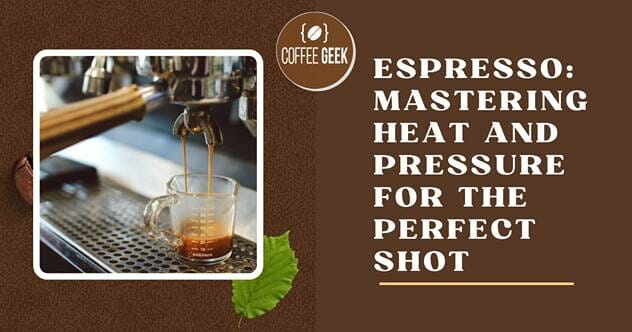
| Coffee Brewing Method | Ideal Water Temperature |
|---|---|
| Drip Coffee | 195°F – 205°F (90°C – 96°C) |
| French Press | 200°F (93°C) |
| Espresso | 190°F – 200°F (88°C – 93°C) |
| Pour-Over | 200°F (93°C) |
| Aeropress | 175°F – 205°F (80°C – 96°C) |
| Cold Brew | Cold Water |
How to Measure and Control the Water Temperature for Coffee Brewing
Using a Thermometer: Ensuring the Correct Brewing Temperature
Inserting a thermometer into your brewing kettle allows you to accurately monitor the water temperature for brewing coffee.
This is particularly useful for pour-over brewing or when you suspect temperature inaccuracies in your coffee maker.
Variable Temperature Kettle: Achieving Precision with Ease
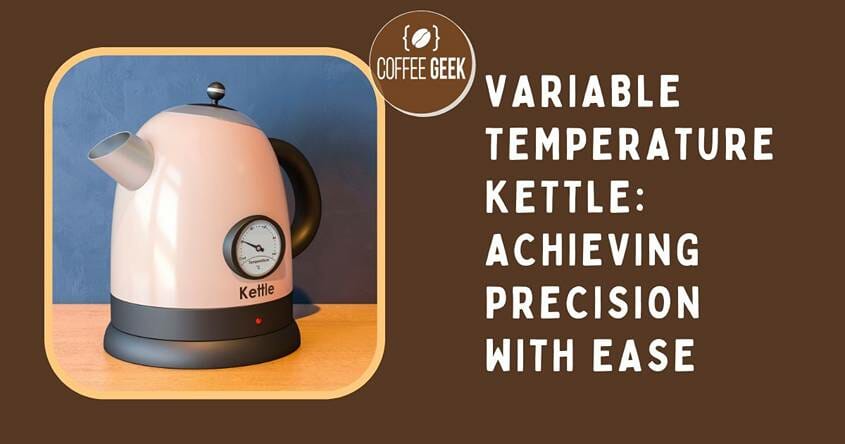
A variable temperature kettle is a worthwhile investment for any coffee enthusiast, enabling you to heat water to the exact temperature required for your preferred brew method.
This level of precision elevates your brewing experience and guarantees a consistently delicious cup.
From Tap to Brew: Adjusting to Room Temperature and Cooling Time
When it comes to brewing, some factors can impact the water temperature, such as room temperature and cooling time. It’s important to understand these factors and how they affect your coffee brewing process.
By keeping these factors in mind and adapting your brewing techniques accordingly, you can ensure a perfect extraction every time.
Factors Affecting Extraction: Grind Size, Brew Time, and Coffee Beans
Grind Size: How it Influences Water Temperature and Extraction
The grind size of beans significantly affects the extraction process, as smaller particles increase the surface area exposed to water, requiring a slightly lower temperature for brewing.
On the other hand, coarser grinds demand hotter water to achieve optimal extraction. Hand-in-hand with the right temperature, a uniform grind size helps to achieve a balanced and flavorful coffee.
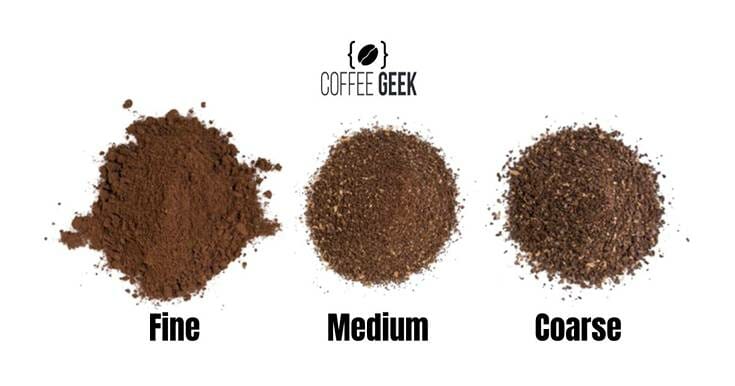
Brew Time: Balancing Temperature and Extraction Time for Best Results
The brew time – the amount of time the water remains in contact with the coffee grounds – also plays a vital role in achieving the perfect extraction.
A general rule of thumb is to use slightly lower temperatures if the brewing time is longer, like in a French Press, and use higher temperature water for a shorter brewing time, like in Pour-over or Espresso, to maintain an impeccably balanced cup.
Coffee Beans: Variability in Origin, Roast, and Freshness Affecting the Ideal Brew Temperature
The ideal brew temperature is also influenced by the coffee beans’ origin, roast, and freshness.
Darker roasts may require a lower temperature since they could taste quite bitter if over-extracted, whereas lighter roasts may need hotter water to bring out their nuanced flavors.
It’s essential to understand and experiment with these factors to unlock the full potential of your coffee beans and achieve the best results.
Identifying and Fixing Under-Extracted and Over-Extracted Coffee
Signs of Under-extracted Coffee and how to Adjust the Temperature
Under-extracted coffee tends to taste sour or weak. When you encounter this issue, increase the water temperature or extend the brewing time, both of which help to extract the desired flavors and achieve an optimal brew.
When Over-extraction Occurs: Cooling it Down for Better Taste
Over-extracted coffee often has a bitter or burnt taste. In this case, lower the brewing temperature of water or shorten the brewing time to reduce the extraction and balance out the flavors in your cup.
Mastering the Art of Coffee Brewing by Honing Temperature Control Skills
Water brewing temperature plays a crucial role in the brewing process, and mastering it is key to making perfectly extracted coffee flavors.
Whether you’re using French Press, Pour-over, or Espresso, understanding the ideal brew temp and refining your skills enables you to achieve the balanced, nuanced, and exquisite taste every coffee lover dreams of.
Ideal Temperature to Brew Coffee Conclusion
So, after all the scientific research, what is the Ideal temperature to brew coffee? We have finally determined the ideal temperature. Drum roll please….it’s between 195°F and 205°F. I mean, thank goodness we have this crucial information.
How could we even begin to enjoy our morning cup of joe without knowing the exact temperature it should be brewed at?
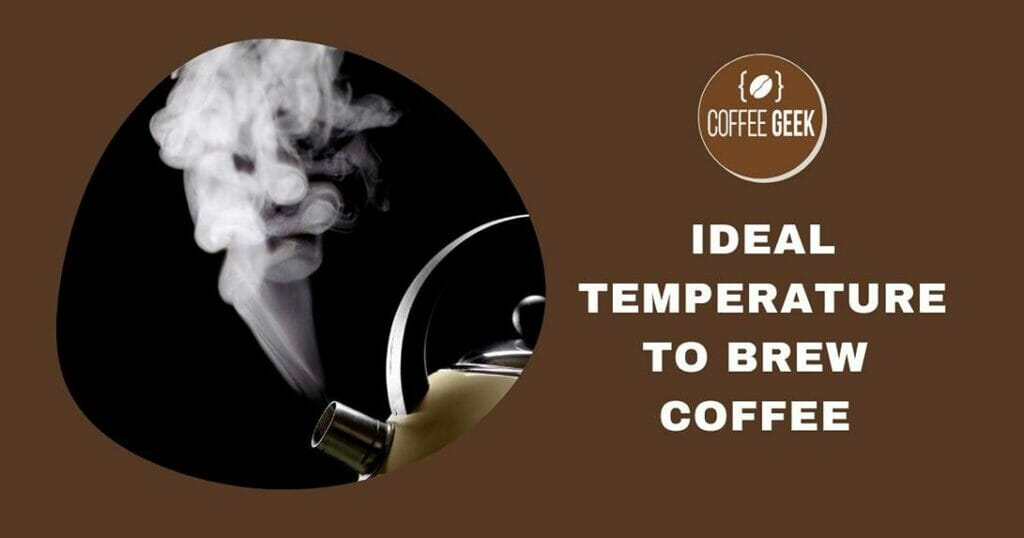
It’s not like coffee is a complex and delicate beverage that requires precision and skilled brewing techniques or anything. Nope, it’s all about the temperature.
So, let’s all go out and buy the fanciest thermometers we can find, because the temperature of our coffee is obviously the most important thing in the world. Who needs taste and flavor when you have the ideal temperature?
FAQs
What is the ideal temperature for brewing coffee?
The ideal temperature for brewing is between 195 and 205 degrees Fahrenheit. This temperature range ensures that the coffee grounds are fully extracted, producing a rich and flavorful cup of coffee.
How does the temperature of the water affect the taste of coffee?
The temperature of the water used for brewing coffee is crucial to the taste of the coffee. If the water is too hot, it can burn the coffee grounds and produce a bitter taste.
If the water is too cold, it may not extract enough flavor from the coffee grounds, resulting in a weak cup of coffee.
Can I use cold water to make hot coffee?
While it is possible to use cold water to make hot coffee, it is not recommended. Cold water can result in a flat-tasting cup of coffee and may not extract enough flavor from the coffee grounds.
Can I use boiling water to make coffee?
Using boiling water to make coffee is not recommended. Boiling water can burn the coffee grounds and result in a bitter taste.
Does the type of coffee I use affect the ideal brewing temperature?
Different types of coffee may require slightly different brewing temperatures. However, in general, the ideal brewing temperature for most types of coffee is between 195 and 205 degrees Fahrenheit.
What is the range of temperatures that are acceptable for brewing?
The range of temperatures that are acceptable for brewing is between 185 and 205 degrees Fahrenheit. However, the ideal temperature for brewing coffee is between 195 and 205 degrees Fahrenheit.
Should I let the water cool after it boils before brewing?
Yes, it is recommended to let the water cool for 30 seconds to 1 minute after it boils before using it to brew coffee. This will ensure that the water is at the ideal brewing temperature of 195 to 205 degrees Fahrenheit.
How important is the water-to-coffee ratio for brewing great coffee?
The water-to-coffee ratio is an important factor in brewing great coffee. It is recommended to use 1 to 2 tablespoons of ground coffee per 6 ounces of water for optimal flavor and strength.

